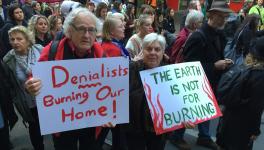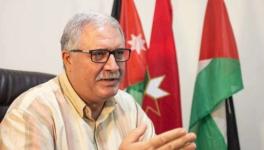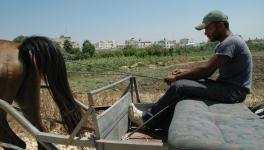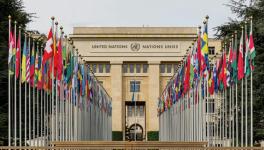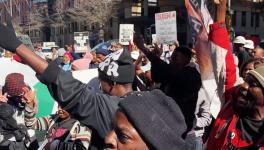Israeli Repression Harms Palestinian Health as World Marks Human Rights Day
Health workers in Palestine exiting a health institution. (Photo: IMEU/Twitter)
The Israeli occupation of Palestine continues to undermine the health of Palestinians. In addition to blocking the essential work of health facilities and targeting health workers, for the past few years Israel has targeted a number of organizations that provide essential health care in occupied areas.
The Health Work Committees (HWC), Bisan Center for Research and Development, and Al Awda have all been the targets of repression for standing up for the rights of Palestinians. Their offices and health centers have been bombed or forcibly closed, their staff members have been arrested in multiple instances, and their funding channels are being deliberately blocked.
Staffing levels at Al Awda, HWC, and Bisan have shrunk sharply over the past 10 years because of this, and so have their budgets. Over the past decade, the three organizations together lost around 2.5 million euro. As a result, they have been able to reach fewer Palestinians than before.
Due to Israeli repression, for example, HWC had to close the majority of its mobile clinics. Bisan estimates that as a result, HWC reached 67,000 fewer Palestinians with their health services, especially in remote areas. This has implications for some of the most important health indicators, including differences in life expectancy and infant mortality, between Palestinians and Israelis, according to preliminary data available to the People’s Health Movement.
The average life expectancy for Palestinians in the occupied Palestinian territories (OPTs) is 74 years. A Jewish Israeli citizen living in Israel reaches the average age of 82.7 years – a difference of almost 10 years. The numbers for infant mortality are equally shocking. For Palestinian children in the OPTs, the infant mortality rate is 16.6/1000, whereas it only is 2.7/1000 for Jewish Israelis. The conclusion is more than clear: apartheid and occupation harm the right to health.
International solidarity
In July 2021, Shatha Odeh, director of HWC, was arrested by Israeli forces and was unjustly detained for 11 months. Ubai Al-Aboudi, director of Bisan, suffered the same fate in 2019 and 2020. On June 9, 2021, the Israeli army destroyed HWC’s offices, took away their equipment, and closed the building for six months. Multiple health centers of Al Awda in Gaza were also bombed and destroyed. The Israeli attacks and smear campaigns are a deliberate strategy to silence criticism and those fighting for the rights of Palestinians.
However, the repression of Palestinian health activists and social organizations does not occur unchallenged and has been the subject of numerous international solidarity campaigns. Organizations such as the People’s Health Movement, Viva Salud, and their Palestinian, Filipino, and Congolese partners, continue to lead such efforts on both the national and international level.
When Israel unjustly placed six Palestinian organizations, including Bisan, on a list of organizations with links to terrorism in October 2021, it sparked a global solidarity campaign called #StandWithThe6.
In July this year, nine EU member states, including Belgium, confirmed their support for these Palestinian organizations. “Israel did not provide substantial evidence of terrorism,” they declared. Critical voices, activists, and social movements remain vital for building international solidarity with Palestine. Without that, the right to health in Palestine will continue to be continuously denied, even as the world marks another Human Rights Day.
People’s Health Dispatch is a fortnightly bulletin published by the People’s Health Movement and Peoples Dispatch. For more articles and to subscribe to People’s Health Dispatch, click here.
Get the latest reports & analysis with people's perspective on Protests, movements & deep analytical videos, discussions of the current affairs in your Telegram app. Subscribe to NewsClick's Telegram channel & get Real-Time updates on stories, as they get published on our website.









